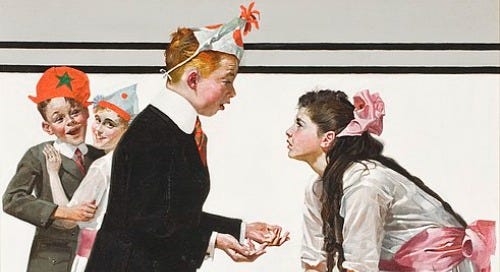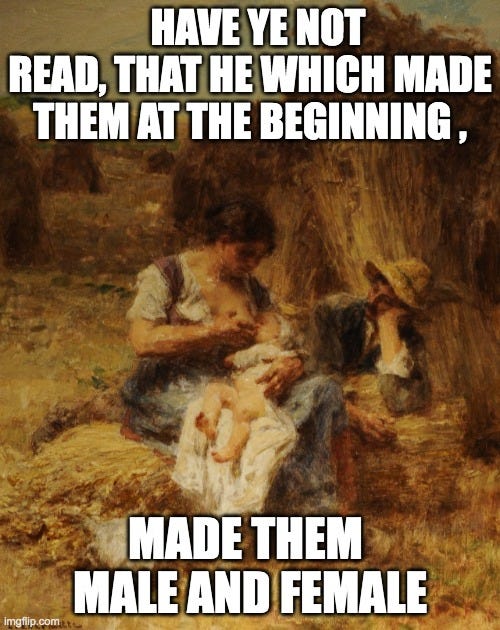It is the same in the case of girls. I am often solemnly asked what I think of the new ideas about female education. But there are no new ideas about female education. There is not, there never has been, even the vestige of a new idea. All the educational reformers did was to ask what was being done to boys and then go and do it to girls; just as they asked what was being taught to young squires and then taught it to young chimney sweeps. What they call new ideas are very old ideas in the wrong place. Boys play football, why shouldn’t girls play football; boys have school colors, why shouldn’t girls have school-colors; boys go in hundreds to day-schools, why shouldn’t girls go in hundreds to day-schools; boys go to Oxford, why shouldn’t girls go to Oxford—in short, boys grow mustaches, why shouldn’t girls grow mustaches—that is about their notion of a new idea. There is no brain-work in the thing at all; no root query of what sex is, of whether it alters this or that, and why, anymore than there is any imaginative grip of the humor and heart of the populace in the popular education. There is nothing but plodding, elaborate, elephantine imitation. And just as in the case of elementary teaching, the cases are of a cold and reckless inappropriateness. Even a savage could see that bodily things, at least, which are good for a man are very likely to be bad for a woman. Yet there is no boy’s game, however brutal, which these mild lunatics have not promoted among girls. To take a stronger case, they give girls very heavy home-work; never reflecting that all girls have home-work already in their homes. It is all a part of the same silly subjugation; there must be a hard stick-up collar round the neck of a woman, because it is already a nuisance round the neck of a man. Though a Saxon serf, if he wore that collar of cardboard, would ask for his collar of brass.
It will then be answered, not without a sneer, “And what would you prefer? Would you go back to the elegant early Victorian female, with ringlets and smelling-bottle, doing a little in water colors, dabbling a little in Italian, playing a little on the harp, writing in vulgar albums and painting on senseless screens? Do you prefer that?” To which I answer, “Emphatically, yes.” I solidly prefer it to the new female education, for this reason, that I can see in it an intellectual design, while there is none in the other. I am by no means sure that even in point of practical fact that elegant female would not have been more than a match for most of the inelegant females. I fancy Jane Austen was stronger, sharper and shrewder than Charlotte Bronte; I am quite certain she was stronger, sharper and shrewder than George Eliot. She could do one thing neither of them could do: she could coolly and sensibly describe a man. I am not sure that the old great lady who could only smatter Italian was not more vigorous than the new great lady who can only stammer American; nor am I certain that the bygone duchesses who were scarcely successful when they painted Melrose Abbey, were so much more weak-minded than the modern duchesses who paint only their own faces, and are bad at that. But that is not the point. What was the theory, what was the idea, in their old, weak water-colors and their shaky Italian? The idea was the same which in a ruder rank expressed itself in home-made wines and hereditary recipes; and which still, in a thousand unexpected ways, can be found clinging to the women of the poor. It was the idea I urged in the second part of this book: that the world must keep one great amateur, lest we all become artists and perish. Somebody must renounce all specialist conquests, that she may conquer all the conquerors. That she may be a queen of life, she must not be a private soldier in it. I do not think the elegant female with her bad Italian was a perfect product, any more than I think the slum woman talking gin and funerals is a perfect product; alas! there are few perfect products. But they come from a comprehensible idea; and the new woman comes from nothing and nowhere. It is right to have an ideal, it is right to have the right ideal, and these two have the right ideal. The slum mother with her funerals is the degenerate daughter of Antigone, the obstinate priestess of the household gods. The lady talking bad Italian was the decayed tenth cousin of Portia, the great and golden Italian lady, the Renascence amateur of life, who could be a barrister because she could be anything. Sunken and neglected in the sea of modern monotony and imitation, the types hold tightly to their original truths. Antigone, ugly, dirty and often drunken, will still bury her father. The elegant female, vapid and fading away to nothing, still feels faintly the fundamental difference between herself and her husband: that he must be Something in the City, that she may be everything in the country.
Thank you for reading Von’s Substack. I would love it if you commented! I love hearing from readers, especially critical comments. I would love to start more letter exchanges, so if there’s a subject you’re interested in, get writing and tag me!
Being ‘restacked’ and mentioned in ‘notes’ is very important for lesser-known stacks so… feel free! I’m semi-retired and write as a ministry (and for fun) so you don’t need to feel guilty you aren’t paying for anything, but if you enjoy my writing (even if you dramatically disagree with it), then restack, please! Or mention me in one of your own posts.
If I don’t write you back it is almost certain that I didn’t see it, so please feel free to comment and link to your post. Or if you just think I would be interested in your post!
If you get lost, check out my ‘Table of Contents’ which I try to keep up to date.
Thanks again, God Bless, Soli Deo gloria,
Von






The book that's from, What's Wrong With The World, is scintillating. GKC was a genius.
Yes! As an eighteen-year-old woman, I think the modern world needs to learn. Yes, it is important that women learn to read, write, and all that is necessary, but it is also important that they learn womanly things, and be allowed to have time for them. I am tired of this society which sees value only in women who pursue careers and have expensive educations. Chesterton certainly was a great mind! I will absolutely be re-stacking this. This needs to be heard far and wide!